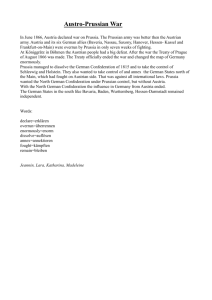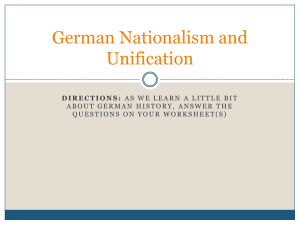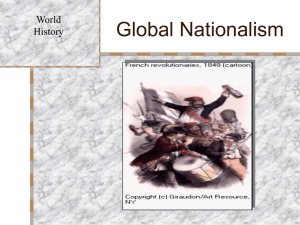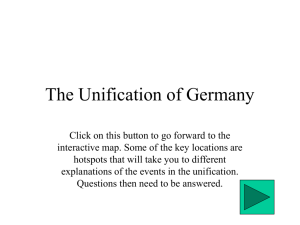Unification of Germany Bismarck
advertisement
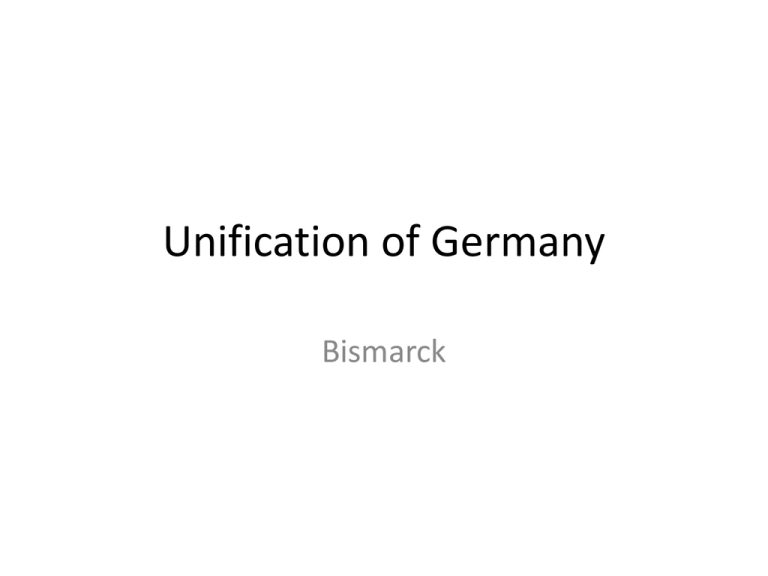
Unification of Germany Bismarck Context • Although Germany did not exist until 1871, it had existed as a concept for hundreds of years • Similar languages and cultures • Since the middle ages, it was loosely organized as the Holy Roman Empire • Strong, independant states, like Prussia had emerged • Post 1815, German nationalism very strong • 1815, 300 independant territories were merged into 39 states • Zollverein was formed in 1833, promoted free trade , industrialization, and railroad construction • Unified religion - protestant The Situation in 1862 -Otto Von Bismarck appointed chancellor of Prussia by King Wilhelm IV -uses Italian unification to his advantage -Blood and Iron used to unify Germany, battles, with Prussia at the helm : • 2 possibilites for german unification – Prussia or Austria as the new Central State • hen, there was Austria, an Empire German by tradition and character (administration), but in which Germans accounted for only about 12 % of the population and which was a multinational state. The GREATER GERMAN SOLUTION would mean the dissolution of the Habsburg Empire and was out of the question. So, the only option would be unification according to the SMALLER GERMAN SOLUTION, without the German territories held by Austria, under the leadership of Prussia. Still, Austria was against this model; Austria still held the presidency in the GERMAN CONFEDERATION, and many of the smaller state administrations, fearing Prussia's dominance, leant on Austria. • Then, Prussia, leading the unification, faced, to a lesser extent, Austria's dilemma. The Prussian provinces of Posen, West Prussia and East Prussia were not part of the German Federation, West Prussia and Posen having a Polish population majority. Other regions located outside of the German confederation, such as the Danish Duchy of SCHLESWIG, the French province of ALSACE and large parts of SWITZERLAND, had a German speaking majority. • The Man Otto von Bismarck was a nobleman, raised in the spirit of Prussian Bureaucracy, in loyalty to Prussia and the Hohenzollern Dynasty. He had been Prussia's ambassador to Russia (1859-62) and to France (1862) before having been appointed chancellor in 1862. He kept distance to Prussia's diet and baffled everybody by stating that Germany's unification would have to be achieved by BLOOD AND IRON. He expanded the military budget, knowing that the recently invented NEEDLE GUN would give Prussia's army an advantage in the field - it could be reloaded 3 times as fast as the hitherto used guns. Bismarck was regarded an outsider. In 1871, unification being accomplished, sceptical criticism and mockery gave way to admiration. Bismarck had turned the dream of many into reality and, by defeating the French, turned lack of confidence (as a political nation) into pride tending towards overconfidence. • The sheer number of soldiers available made massencirclement and destruction of enemy formations. The army was still equipped with the "needle-gun" Dreyse rifle of fame from the Battle of Dresden during Austro-Prussian War 1866, but by this time was showing the age of its 25 year old design. The deficiencies of the needle-gun were more than compensated for by the famous Krupp 6 pounder (3 kg) breech-loading cannons being issued to Prussian artillery batteries. Firing a contact-detonated shell filled with zinc balls and explosive, the Krupp gun had a range of 4,500 meters and blistering rate of fire compared to muzzle loading cannon. Factors leading to Unification • Zollverin- Customs union • Economic unification • Building of railroads moved resources across the conferation • This union excluded Austria, and fueled German identity 1st War of Unification • • • • • • • • • • • • • 1864 – Prussia and Austria vs Denmark Schleswig and Holstein were two german duchies under Danish rule Largely german speaking 1840s, danes tried to claim it as theirs instead of letting them be semiindependant Uproar from german nationalists Treaty of LONDon – 1863 – they would be under danish rule, but remain outside of the Danish Nation state Treaty broken b y Prince Outcry of “German nationalists German confederation mobilized its forces Battle, German confederation wins Holstein went to |Austria, Schleswig Prussia Bismarck later provokes Austria Schleswig-Holstein. Schleswig and Holstein are two German duchies that were under Danish rule. • Austrian-Prussian War. • In 1866 • further arguments about the administration of SchleswigHolstein led to war breaking out between Austria and Prussia. • This war lasted 7 weeks and resulted in Prussian victory over the Austrians. • In beating the Austrians on the battlefield the Prussians assumed the role of senior Germanic state. This led to the smaller states to align themselves alongside the Prussians, with whom they shared more economic ties due to the aforementioned Zollverin customs agreement. • Key to victory, needle gun and Krupp Cannon The Franco-Prussian War • Between 1866 and 1870 relations between Prussia and France soured. • In 1870, A Hollerzollerin, (Prussian Noble Family) was about to take the throne of Spain • King of Prussia, sent Ems Dispatch, Bismarck intercepted it, reworded it to sound harsh • France declared war on Prussia-prussia wins easily • Prussian power is clear, other German states rally around them • Following victory over France in January of 1871, Prussia was able to persuade her partners within the German confederation that unification was desirable. As a result, Wilhelm of Prussia was proclaimed Emperor of Germany on January 18th 1871. The Second German Reich was born. • The new German state which doesn’t include Austria was declared in the Hall of mirrors at Versailles • King Wilhelm I becomes Kaiser Legacy • Pax Germanica • After 7 weeks war, Bismarck didn’t let troops march through Vienna – keep Austria an ally • But he embarrased france at Versailles • To0k Alsace and Lorraine • German state strongest power in teh world • Balance of power destroyed • Bismarck sets out alliances to isolate France • Builds super strong navy – rival Britain • Peace lasted until 1914 • Bismarck replaced in1890

